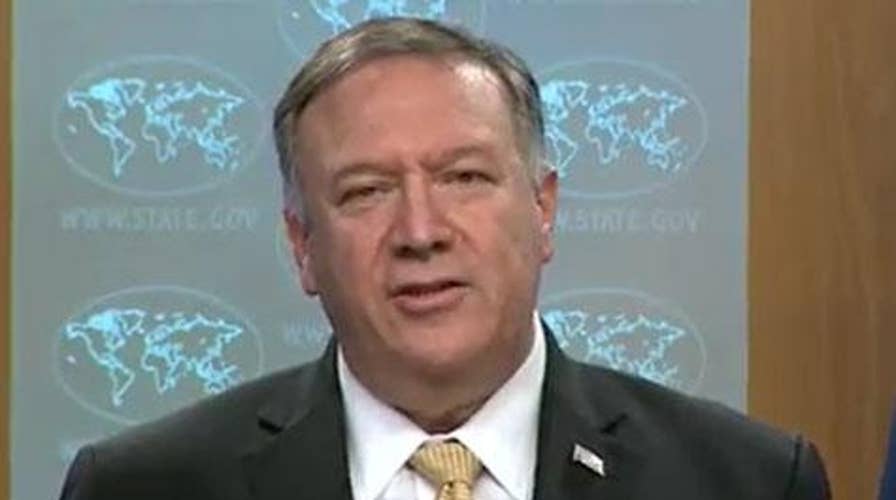Trump administration reverses Obama policy on Israeli settlements
Rich Edson report Secretary Mike Pompeo announced a major change on Israel policy
Secretary of State Mike Pompeo announced Monday that the U.S. government will ease its stance on Israeli settlements in the West Bank, in the latest move by the Trump administration to bolster Israel's position and undermine Palestinian claims regarding land sought for a future state.
Pompeo essentially rejected a 1978 State Department legal opinion holding that civilian settlements in the occupied territories are “inconsistent with international law.” He also said the White House was reversing an Obama administration directive that allowed the U.N. Security Council to pass a resolution declaring the settlements a “flagrant violation” of international law.
"The Trump administration is reversing the Obama administration's opposition to Israeli settlements in the West Bank," Pompeo said. "The establishment of Israeli settlements in the West Bank is not inconsistent with international law."
GAZA MILITANTS FIRE ROCKETS INTO ISRAEL HOURS AFTER CEASE-FIRE DECLARED
Pompeo added that the Trump administration believes that calling the Israeli settlements illegal under international law is not moving a peace process between the Israelis and Palestinians forward.
“Calling the establishment of civilian settlements inconsistent with international law has not advanced the cause of peace,” he said. “The hard truth is that there will never be a judicial resolution to the conflict, and arguments about who is right and who is wrong as a matter of international law will not bring peace.”
Pompeo added: "The vision of peace this administration has, we've created space for this."
Trump already broke with his predecessors by deciding earlier to recognize Jerusalem as Israel’s capital, moving the U.S. Embassy to that city and closing the Palestinian diplomatic office in Washington.
Even though the decision is largely symbolic, it could give a boost to Israeli Prime Minister Benjamin Netanyahu, who is fighting for his political survival after he was unable to form a coalition government following recent elections.
In addition, it could spell further trouble for the administration’s oft-promised peace plan, which is unlikely to gather much international support by endorsing a position contrary to the global consensus.
The Netanyahu government was dealt a blow on settlements just last week when the European Court of Justice ruled products made in Israeli settlements must be labeled as such.
GAZA VIOLENCE SHOWS THAT HUMAN SUFFERING SPARES NO SIDES IN WAR
The 1978 legal opinion on settlements is known as the Hansell Memorandum. It had been the basis for more than 40 years of carefully worded U.S. opposition to settlement construction that had varied in its tone and strength depending on the president’s position.
The international community overwhelmingly considers the settlements illegal. This is based in part on the Fourth Geneva Convention, which bars an occupying power from transferring parts of its own civilian population to occupied territory.
"It hasn't worked," Pompeo said about the Obama administration's move. "It hasn't advanced the cause of peace."
Pompeo said that the U.S. would not take a position on the legality of specific settlements and that that the new policy would not extend beyond the West Bank and create a precedent for other territorial disputes. He added that the decision did not mean the administration was prejudging the status of the West Bank in any eventual Israeli-Palestinian peace agreement.
“This is only solved by negotiations between the Israeli and Palestinians,” he added.
The anti-settlement monitoring group Peace Now, along with AP reporting, has found a sharp increase in settlement planning and construction since Trump took office.
Israel captured the West Bank and east Jerusalem in the 1967 Mideast war and quickly began settling the newly conquered territory.
Today, some 700,000 Israeli settlers live in the two areas, which are both claimed by the Palestinians for their state. After the war, it immediately annexed east Jerusalem, home to the holy city’s most important religious sites, in a move that is not internationally recognized.
CLICK HERE TO GET THE FOX NEWS APP
But Israel has never annexed the West Bank, even as it has dotted the territory with scores of settlements and tiny settlement outposts. While claiming the fate of the settlements is a subject for negotiations, it has steadily expanded them.
Some major settlements have over 30,000 residents, resembling small cities and serving as suburbs of Jerusalem and Tel Aviv.
The Palestinians and supporters say the settlements undermine hopes for a two-state solution by gobbling up land sought by the Palestinians.
The Associated Press contributed to this report.







